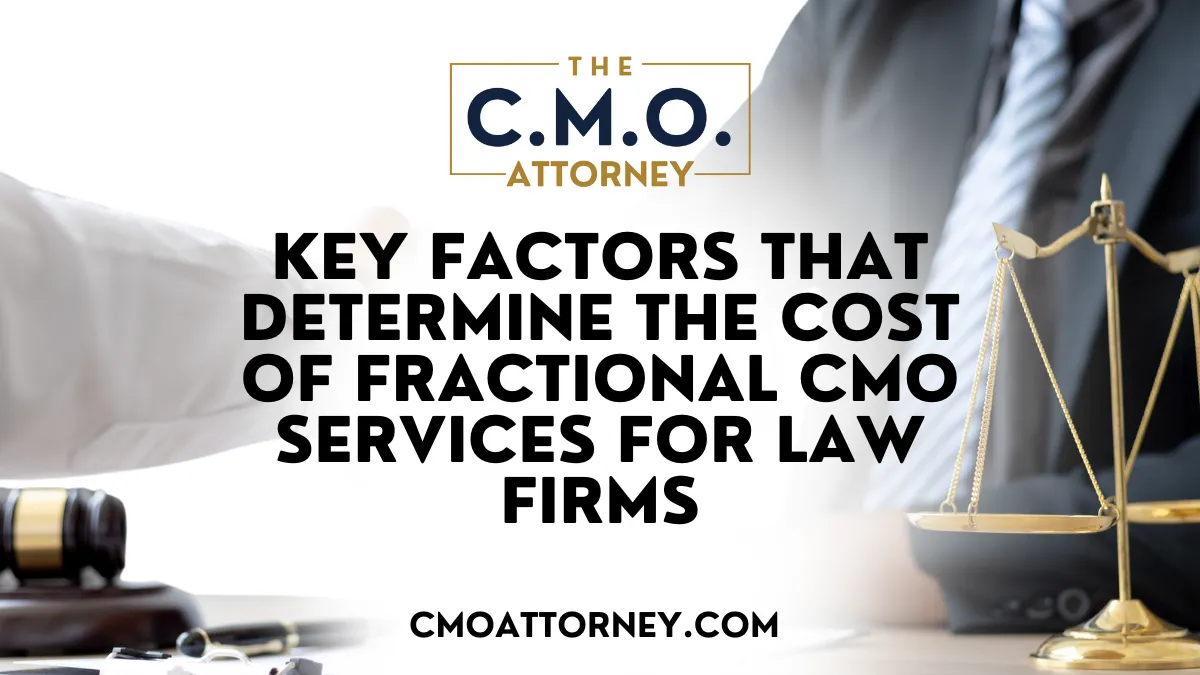 Table Of Contents:
Table Of Contents:
- Understanding the Cost Structure of Fractional CMO Services for Law Firms
- Factors That Affect the Overall Cost of Hiring a Fractional CMO
- ROI Considerations When Hiring a Fractional CMO
- Factors Influencing Retainers and Hourly Rates for CMOs
- The Impact of Legal Marketing Trends on CMO Pricing
- Frequently Asked Questions About Fractional CMO Costs for Law Firms
- Frequently Asked Questions About Fractional CMO Costs for Law Firms
- Conclusion
What Factors Influence the Pricing of Fractional CMO Services for Legal Practices?
Understanding the cost of hiring a fractional Chief Marketing Officer (CMO) is crucial for law firms aiming for sustainable development in their marketing efforts. Many attorneys wonder, “What is a fractional CMO, and how much does it cost?” This article explores the cost structure behind fractional CMO services, the factors influencing retainers and hourly rates, and the return on investment (ROI) considerations. By engaging with this content, law firms will gain valuable insights into navigating digital marketing for lawyers and make informed decisions that align with their goals. Ultimately, this understanding can alleviate confusion around pricing and help law firms optimize their marketing budgets effectively. The CMO Attorney wants you to be educated on the role of fractional CMO – so let’s get started, but if you’re ready – we’re here for a free consultation of your firm’s marketing plan and growth strategy!
James Frazier | The CMO Attorney | Fractional CMO
The Cost Structure of Fractional CMO Services for Law Firms
The cost structure of fractional CMO services for law firms varies based on several key factors. This section will examine what is a fractional cmo, the different pricing models for fractional CMOs, the influence of experience on service fees, how the scope of services affects pricing, and the impact of geographic location on costs. It will also explore the value of specialized legal marketing knowledge in enhancing brand awareness and effectively reaching the target audience through strategies like digital marketing for lawyers, email marketing, and training.
Breakdown of Common Pricing Models for Fractional CMOs
Fractional CMO services for law firms typically operate under several pricing models, each designed to suit the unique needs of the firm. Some common structures include hourly rates, project-based fees, and retainer agreements. For example, a law firm focused on mergers and acquisitions may choose a project-based fee for specific marketing initiatives, while a firm seeking ongoing social media marketing strategies might prefer a retainer model to ensure continuous support and optimization of digital marketing for lawyers. To learn more about what is a fractional cmo, visit our about us section.
The choice of pricing model can also be influenced by the specific services needed, such as conversion rate optimization for website performance or targeted campaigns for the sales team. Each law firm must assess its goals and budget to find the model that aligns best with its marketing strategies. Understanding these pricing structures allows firms to make informed decisions and maximize the value of fractional CMO services, thereby enhancing overall marketing effectiveness.
The Role of Experience in Determining Service Fees
The experience of a fractional Chief Marketing Officer (CMO) directly impacts service fees, as it correlates with the value they bring to a law firm’s marketing strategy. A seasoned CMO typically has a well-honed ability to create tailored strategies that enhance online presence and improve search engine optimization (SEO). This expertise can serve as a significant asset during challenging economic times, such as a recession, where effective marketing efforts can distinguish a firm from its competitors.
Moreover, collaboration with an experienced fractional CMO can lead to more efficient executions of marketing initiatives. Firms that invest in higher service fees for experienced professionals often benefit from their insights, which tend to result in more successful campaigns and better client engagement. By understanding the nuances of the legal market, these CMOs can devise strategies that not only attract potential clients but also foster long-term relationships, ultimately contributing to the firm’s growth and stability.
How Service Scope Influences CMO Pricing
The scope of services required from a fractional CMO significantly shapes the pricing structure. Law firms may seek a variety of marketing strategies, including those that enhance online presence or foster community culture through retail initiatives. Depending on whether the firm prioritizes brand awareness or lead generation, the fractional CMO service may need to adjust their offerings to align with the law firm’s specific objectives and key results, influencing overall costs accordingly.
When determining the appropriate service scope, law firms must clearly define their marketing goals to ensure they receive value for the investment. For instance, a firm focusing on improving client engagement might require ongoing support, while another aiming for a specific campaign may only need short-term assistance. Understanding how these variables interact allows law firms to make informed decisions about hiring fractional CMOs, ensuring that services provided directly contribute to reaching their business objectives.
The Impact of Geographic Location on CMO Costs
The geographic location of a law firm plays a significant role in determining the costs of fractional CMO services. Firms situated in urban areas often face higher service fees due to increased demand for specialized digital marketing strategies and higher living costs for professionals. On the other hand, firms in less populated regions may benefit from more affordable pricing options, but they must balance this with the need for sustainable marketing efforts that effectively reach their customer base.
Moreover, the rise of remote work has changed how fractional CMOs operate, allowing law firms to engage talent from diverse locations without geographical constraints. This flexibility can lead to cost savings, as firms can select CMOs with the expertise they need at competitive rates, regardless of their physical location. Understanding the implications of both location and remote work enables law firms to strategically manage their marketing budgets while implementing effective risk management practices that align with their growth objectives.
Evaluating the Value of Specialized Legal Marketing Knowledge
Specialized legal marketing knowledge is a critical factor influencing the pricing of fractional CMO services for law firms. A marketing agency equipped with expertise in the legal sector can effectively navigate the complexities of digital transformation while addressing the specific demands of law firms. This proficiency allows fractional CMOs to develop tailored strategies that resonate with potential clients, directly impacting engagement and conversion rates.
The value of experienced CMOs extends beyond basic marketing tactics, as they understand the unique dynamics of the legal market and client needs. This insight often justifies a higher price point for services, especially in environments with high demand for specialized skills. By leveraging this expertise, law firms can optimize their marketing efforts, creating a more efficient workforce that drives sustainable growth and long-term success.
Factors That Affect the Overall Cost of Hiring a Fractional CMO
The overall cost of hiring a fractional Chief Marketing Officer (CMO) is influenced by several key factors. The duration of engagement and its relation to pricing structure play a critical role, as do variable costs associated with CMO services. Assessing the complexity of a law firm’s marketing needs and how marketing budget allocation affects costs are essential considerations. Additionally, comparing in-house marketing teams to fractional CMOs offers insights into accessibility and effectiveness, ultimately impacting customer engagement and advertising campaign success.
Duration of Engagement and Its Effect on Pricing
The duration of engagement significantly influences the pricing structure of fractional CMO services for law firms. A longer contract often provides more value, as it allows for a deeper understanding of the firm’s unique needs and strategic thinking that aligns with its objectives. During negotiations, firms may find that committing to extended periods can lead to cost savings and improved marketing outcomes, as continuity in service fosters consistency in brand messaging and client engagement.
Conversely, short-term engagements may result in higher per-hour costs due to the need for expedited strategic development. Law firms must assess their marketing landscape and specific goals to determine if a longer commitment is beneficial. This evaluation enables firms to invest wisely in fractional CMO services, ensuring that their marketing strategies are not only effective but also sustainable in a competitive environment.
Variable Costs Associated With CMO Services
Variable costs associated with fractional CMO services can significantly impact the overall investment for law firms. These costs may include expenses related to specific marketing tactics, such as search engine optimization (SEO), targeted advertising campaigns, and marketing automation tools. For instance, when a law firm engages a consultant to enhance their digital presence, they may need to allocate additional resources for content creation and advertising agency fees to ensure effective outreach.
Firms must also consider the bandwidth required to execute these marketing strategies effectively. Engaging a fractional CMO may mean additional costs for software subscriptions or training staff on new marketing automation systems. Understanding these variable costs allows law firms to plan their budgets better and maximize the return on investment for their marketing efforts, ultimately leading to increased client acquisition and retention.
Assessing the Complexity of Marketing Needs for Law Firms
Assessing the complexity of marketing needs for law firms is crucial to understanding the overall cost of hiring a fractional CMO. Each organization may have unique requirements based on its target market and the specific value proposition it offers to clients. For example, firms that specialize in niche areas of law may need experts who can provide tailored marketing strategies that resonate with a wealth of potential clients seeking specialized legal services.
A law firm’s marketing needs may also vary depending on its internal capabilities and existing resources. If a firm has limited experience with digital marketing, it might require a more comprehensive approach, resulting in higher costs. Conversely, a firm with a strong marketing foundation may look for targeted support, which could lead to more manageable pricing. Understanding these nuances allows law firms to invest wisely in fractional CMO services, ensuring alignment with their goals and maximizing their budget efficiency.
Marketing Budget Allocation and Its Influence on Costs
Marketing budget allocation significantly influences the costs associated with hiring a fractional CMO for law firms. Organizations must prioritize spending on strategies that offer the greatest returns, such as viral marketing campaigns that drive client engagement. For instance, firms that invest in high-quality copywriting and content creation may enhance their online presence and brand perception, ultimately leading to better client acquisition.
The perception of value in marketing services is shaped by how budget allocations are distributed among various initiatives. A law firm prioritizing a flat rate for extensive marketing services can achieve a more cohesive approach, harmonizing their organizational culture around shared marketing objectives. By thoughtfully allocating resources, firms can maximize the effectiveness of their marketing efforts, ensuring that they achieve their goals in a competitive landscape.
Comparing in-House Marketing Teams Versus Fractional CMOs
When evaluating the expense of hiring a fractional CMO versus maintaining an in-house marketing team, law firms must consider the consumption of resources tied to personnel overheads and varying salary expectations. An in-house team often includes benefits, training costs, and ongoing professional development, which can elevate overall financial commitments. On the other hand, fractional CMOs offer a flexible model that allows firms to utilize expertise without the burdens of a full-time commitment, leading to potentially lower expenses and greater efficiency in lead generation initiatives.
Engaging a fractional CMO can provide law firms with targeted marketing strategies while minimizing the complexities of an internal supply chain. Stakeholders can assess the effectiveness of both approaches based on the return on investment from marketing efforts. For example, a fractional CMO may bring specialized knowledge to enhance campaign performance, ultimately driving better results without the fixed costs associated with a permanent team. This insight allows firms to allocate their budgets more effectively while pursuing their marketing goals.
ROI Considerations When Hiring a Fractional CMO
Measuring the financial impact of fractional CMO services involves analyzing the cost-benefit ratio for legal practices, understanding client acquisition costs, and recognizing the long-term value gained through effective marketing strategies. This section will provide insights through case studies, showcasing successful outcomes from fractional CMO engagements while focusing on resource allocation and effective content strategy distribution.
Measuring the Financial Impact of CMO Services
Measuring the financial impact of fractional CMO services involves analyzing how various marketing initiatives contribute to a law firm’s bottom line. For instance, incorporating advanced web development techniques can significantly enhance user experience, driving higher conversion rates. Additionally, employing effective sales strategies that align with automated marketing solutions allows firms to optimize client acquisition while reducing costs associated with lead generation.
Firms can leverage leadership insights from fractional CMOs to evaluate the return on investment associated with specific products or services. By implementing data-driven marketing and automation features, law firms can track campaign performance and adapt strategies accordingly. This targeted approach not only leads to a more efficient allocation of resources but also maximizes the impact of marketing efforts, ensuring sustainable growth and a solid ROI.
Analyzing the Cost-Benefit Ratio for Legal Practices
Analyzing the cost-benefit ratio of hiring a fractional CMO for law firms allows organizations to make informed decisions about their marketing investments. By outsourcing marketing services, firms can leverage the expertise of a specialized professional without the expenses associated with full-time recruitment. This dynamic helps firms allocate resources more effectively, enhancing their digital marketing efforts while maximizing return on investment.
When evaluating the effectiveness of fractional CMO services, law firms must consider how these marketing strategies align with their overall business objectives. For instance, engaging a fractional CMO can lead to faster implementation of digital marketing campaigns that drive client engagement and improve conversion rates. This results in a more agile approach to marketing, supporting sustained growth while keeping costs manageable and predictable.
Understanding Client Acquisition Costs With a Fractional CMO
Understanding client acquisition costs is essential for law firms when engaging a fractional CMO. These costs, which include spending on various marketing channels and strategic planning initiatives, can significantly impact a firm’s overall budget. By evaluating how a fractional CMO’s expertise in optimizing workflow influences these costs, firms can better direct their resources towards effective strategies that drive client engagement and growth.
A fractional CMO plays a crucial role in analyzing the efficiency of marketing efforts and ensuring that resources are allocated wisely. Through focused attention on client acquisition metrics, they help law firms identify the most profitable pathways to attract new clients. This approach not only maximizes return on investment but also supports the firm’s long-term objectives, aligning with the strategic insights expected from a chief information officer in a corporate setting.
Long-Term Value Gained Through Effective Marketing Strategies
Long-term value generated through an effective marketing strategy becomes clear as law firms observe increased client engagement and retention over time. By focusing on efficiency in marketing operations, fractional CMOs can implement tailored campaigns that resonate with the target audience. This strategic alignment helps firms build a robust brand presence while navigating the complexities of the legal industry’s ever-shifting political landscape and client behavior.
Furthermore, incorporating experienced fractional CMOs into the advisory board can enhance a firm’s marketing acumen. These professionals offer insights that drive sustainable growth and refine strategic approaches, ensuring that law firms can effectively adapt to changing client needs. By establishing a clear focus on long-term objectives, law firms can enjoy measurable returns on their investment in marketing services, solidifying their position in the competitive legal market.
Case Studies: Successful Outcomes From Fractional CMO Engagements
Case studies illustrate the effectiveness of fractional CMO services in achieving successful outcomes for law firms. For instance, a firm implementing targeted pricing strategies with the guidance of a fractional CMO boosted their client acquisition rate significantly. By optimizing their landing page and aligning marketing efforts with industry regulations, they were able to enhance their visibility and reconcile marketing budget allocations with overall business model objectives.
In another case, a law firm engaged a fractional CMO to refine its marketing budget, focusing on both digital presence and client engagement strategies. The implementation of data-driven insights led to a notable increase in lead conversion rates, demonstrating how tailored marketing approaches can yield substantial returns. Such examples underscore the potential benefits of hiring fractional CMOs, particularly in navigating complex regulatory environments while maximizing marketing effectiveness.
Factors Influencing Retainers and Hourly Rates for CMOs
Factors influencing retainers and hourly rates for fractional CMOs are essential for law firms to understand. Common pricing strategies vary, reflecting the complexity of legal marketing needs. Contract length can significantly impact service rates, while flexible payment options enhance accessibility. Initial consultations and proposals set expectations, and transparency in pricing helps identify any hidden costs, ensuring a favorable return on investment.
Common Pricing Strategies Employed by Fractional CMOs
Common pricing strategies employed by fractional CMOs for law firms often revolve around the concept of scalability and value proposition. Many fractional CMOs offer flexible payment structures, including retainer agreements and performance-based fees, which align their incentives with the firm’s objectives. For instance, a law firm looking to enhance its healthcare practice may engage a fractional CMO who tailors services to boost client engagement while ensuring costs remain manageable and responsive to market demands.
The skill level and experience of a fractional CMO also play a crucial role in determining service rates. A highly skilled fractional CMO may command higher fees; however, this investment often leads to improved marketing outcomes and higher return on investment for the firm. Law firms should consider investing in professionals who possess specialized knowledge of their practice area, as this can yield significant benefits, including effective resource allocation and enhanced lead generation strategies tailored specifically to their target audience.
The Influence of Contract Length on Service Rates
The length of the contract with a fractional Chief Marketing Officer (CMO) significantly affects the overall service rates. Longer engagements often result in lower per-hour fees, as they allow the CMO to develop a deeper understanding of the law firm’s unique marketing needs. This continuity fosters loyalty between the marketing team and the CMO, leading to improved efficiency and strategic alignment that can enhance the firm’s reputation management efforts.
Moreover, engaging a fractional CMO for an extended period helps to minimize overhead costs typically associated with executive search processes that come with onboarding new team members. Law firms benefit from stable marketing leadership that can provide consistent insights and responsive strategies over time. By investing in a long-term partnership, firms can ensure that their marketing objectives are met while maximizing cost-effectiveness and overall impact on their client acquisition strategies.
Assessing the Flexibility of Payment Options
When assessing the flexibility of payment options for fractional Chief Marketing Officer (CMO) services, law firms must consider various structures that align with their financial strategies. Options such as retainer agreements or hourly rates can be adapted based on the anticipated customer lifetime value generated from marketing efforts. By choosing a model that reflects the firm’s unique needs, stakeholders can ensure that their investment in CMO services is directly contributing to revenue growth and efficient resource allocation.
Furthermore, understanding the implications of payment flexibility also allows firms to incorporate ongoing training and development initiatives that enhance their marketing strategies. This adaptability can motivate teams to engage with the CMO more effectively, leveraging data science to measure marketing performance and optimize campaigns. By employing these insights, law firms can maximize their marketing budgets while achieving targeted outcomes that resonate with their objectives.
What to Expect From Initial Consultations and Proposals
During initial consultations with a fractional CMO, law firms can expect a comprehensive discussion surrounding their specific marketing needs and goals. This meeting serves as an opportunity for the CMO to demonstrate their methodology, shedding light on how they plan to effectively address factors such as employee retention and brand identity. By establishing a transparent process grounded in ethics, the fractional CMO can build trust, illustrating how their strategies will align with the law firm’s long-term vision.
Following the initial consultation, firms will receive a proposal outlining the scope of services, alongside associated costs. This proposal typically includes details on salary expectations, structure, and the specific mentorship approach the CMO will employ to support the firm’s marketing objectives. It is crucial for law firms to review these proposals carefully, as they highlight the value that a fractional CMO brings through strategic insights and tailored solutions designed to enhance client engagement and drive measurable results.
Transparency in Pricing: Understanding Hidden Costs
Transparency in pricing is vital when law firms engage fractional CMOs, as hidden costs can significantly affect the overall investment. Often, contracts may entail additional fees for specialized services such as data analysis or marketing automation tools. Understanding these potential charges ensures firms can gauge the true cost of ownership associated with fractional CMO services and align their budget accordingly.
The concept of clear communication regarding fees fosters trust and ensures that law firms fully comprehend what they pay for. By openly discussing possible variable costs related to campaigns or strategic initiatives, fractional CMOs can help firms effectively manage their finances. This approach not only enhances clarity but also aids in establishing a mutually beneficial relationship, enhancing income generation through strategic marketing investments.
James Frazier | The CMO Attorney | Your Future Fractional CMO
The Impact of Legal Marketing Trends on CMO Pricing
The cost of fractional chief marketing officer services for law firms is influenced by several legal marketing trends. Evaluating the demand for digital marketing expertise reveals how client expectations shape CMO costs. Additionally, technological advancements redefine pricing models, while market research impacts legal marketing strategies. Understanding these dynamics prepares firms for future changes in the legal marketing landscape and enhances customer experience.
Evaluating the Demand for Digital Marketing Expertise
The demand for digital marketing expertise among law firms has surged as market trends shift toward online advertising. Firms recognize that effective marketing strategies, tailored for the legal landscape, require skilled professionals who understand the nuances of digital platforms. This expertise is critical for navigating risks associated with a rapidly changing environment, where traditional marketing methods may no longer suffice.
Investing in fractional CMO services equipped with specialized knowledge in digital marketing enhances a firm’s ability to connect with potential clients. By leveraging human capital that understands the latest market trends, law firms can position themselves competitively and improve their outreach. This alignment not only justifies the costs associated with hiring a fractional CMO but also leads to better client engagement and sustained growth over time.
Trends in Client Expectations Affecting CMO Costs
Trends in client expectations significantly influence the costs associated with fractional CMO services for law firms. As clients increasingly seek higher visibility and engagement through innovative marketing strategies, fractional CMOs are expected to provide strategic leadership that incorporates contemporary marketing practices. Law firms that prioritize these expectations often invest more in services that enable them to effectively convey their commitment to corporate social responsibility, enhancing their reputation in a competitive landscape.
The onboarding process for new clients has also evolved, with firms needing to demonstrate their adaptability in response to shifting client demands. As clients look for personalized interactions and greater transparency, the costs of fractional CMO services can rise as firms require specialized skills to create tailored strategies. By aligning their marketing approaches with these expectations, law firms can better position themselves to attract and retain clients, ensuring that their investment in marketing translates to sustained growth and success.
The Role of Technological Advancements in Pricing Models
Technological advancements play a pivotal role in shaping pricing models for fractional CMO services within law firms. As firms increasingly utilize digital tools for content creation and performance audits, the complexity of these services can influence overall costs. A fractional CMO that can effectively integrate technology into marketing strategies can offer enhanced capabilities, justifying potentially higher fees while delivering measurable results.
Moreover, technology enables law firms to conduct thorough due diligence before engaging a fractional CMO, allowing them to assess various options that align with their specific marketing needs. Utilizing advanced analytics, firms can analyze the performance of previous campaigns and develop more accurate forecasts for future expenditures. This informed approach empowers law firms to allocate their marketing budgets efficiently, ensuring that investments translate into substantial client engagement and retention outcomes.
Market Trends That Influence Legal Marketing Strategies
Market trends significantly influence legal marketing strategies, impacting firms’ approaches to brand management and reputation building. As the demand for specialized legal services, such as accounting and intellectual property, grows, law firms must adapt their marketing tactics to resonate with potential clients. By leveraging the insights of a fractional chief marketing officer, these firms can position themselves effectively within their niche, ensuring that their branding reflects expertise and instills trust among their audience.
Furthermore, the shift towards digital marketing strategies has compelled law firms to embrace innovative tactics that align with current client expectations. Engaging content, social media presence, and personalized communication become essential in enhancing brand visibility and fostering a strong reputation. A fractional CMO can help establish these strategies, allowing firms to maintain competitiveness in an evolving legal landscape and effectively respond to changing market conditions.
Preparing for Future Changes in the Legal Marketing Landscape
As the legal marketing landscape evolves, law firms must strategically leverage emerging trends to stay competitive. Conducting thorough research on consumer behavior helps firms identify shifts in client expectations, allowing them to adjust their marketing strategies accordingly. By embracing advancements in technology and social media, firms can enhance their customer service and engagement efforts, positioning themselves as responsive and modern entities in the eyes of potential clients.
Preparing for future changes requires law firms to remain proactive in their marketing approaches. By investing in ongoing training and development for marketing teams, firms can adapt to new social media platforms and consumer communication preferences effectively. This adaptability not only enhances client relationships but also influences the cost of fractional CMO services, as firms seek professionals who can navigate these dynamically changing landscapes and provide insightful strategies tailored to the evolving needs of their clients.
Frequently Asked Questions About Fractional CMO Costs for Law Firms
This section addresses key questions regarding the costs associated with fractional CMO services tailored for law firms. It will cover important considerations such as what firms should budget for these services, the methods used to assess the value a fractional CMO brings, and typical cost ranges for various marketing initiatives. Additionally, it will highlight strategies to optimize investments in CMO services and essential factors to consider when negotiating fees, including the influence of customer acquisition cost, fee structures, and how cost of living may vary by location.
What Should Law Firms Budget for Fractional CMO Services?
Law firms should budget carefully for fractional CMO services by considering their specific marketing communications needs and strategic management objectives. A well-planned budget should account for both the immediate costs of engaging a fractional CMO and the potential long-term benefits of building a robust marketing infrastructure. By investing in professional expertise, firms can enhance their marketing effectiveness and navigate periods of uncertainty more effectively.
In establishing their budget, law firms must also factor in the policies and practices that will govern their marketing efforts. Engaging a fractional CMO enables firms to create customized strategies that align with their operational goals and demands in the competitive legal marketplace. By recognizing these key components, law firms can better allocate their financial resources and optimize their marketing operations, ultimately leading to improved client acquisition and retention.
How Do Law Firms Assess the Value of a Fractional CMO?
Law firms assess the value of a fractional Chief Marketing Officer (CMO) by evaluating how effectively their marketing strategies enhance brand loyalty and drive revenue growth. A fractional CMO can introduce innovative content marketing approaches that engage potential clients, leading to increased trust and value perception within the firm. Understanding the CMO’s impact on these key metrics helps firms determine the return on investment from their marketing expenditures.
Additionally, the contribution of a fractional CMO to human resources is significant, as better marketing strategies can improve employee morale and engagement. When staff members see the firm’s efforts resonating with clients, it fosters a sense of pride and belonging, resulting in better performance. Ultimately, law firms must consider both financial outcomes and the positive effects on employee satisfaction when evaluating the overall effectiveness of a fractional CMO‘s services.
What Are Typical Cost Ranges for Different Marketing Services?
Typical cost ranges for fractional Chief Marketing Officer services can vary widely based on the specific marketing services provided. For example, effective brand management can often range from $2,000 to $10,000 per month, depending on the firm’s goals and the complexity of the campaigns. Services like market analysis and market segmentation may incur additional costs, which can be strongly influenced by the level of expertise required to comply with regulations such as the General Data Protection Regulation. Understanding these cost ranges enables law firms to evaluate their budget and select services that align with their strategic objectives.
Furthermore, firms aiming to enhance their marketing impact should consider that investing in specialized services pays off through improved client engagement and retention. Fractional CMOs often provide insights that directly inform branding and outreach efforts, leading to a more targeted and effective marketing strategy. By allocating resources wisely for market segmentation and analysis, law firms can effectively reach their intended audience and optimize their overall marketing investment, emphasizing the importance of thorough preparation when engaging a fractional CMO.
How Can Law Firms Optimize Their Investment in CMO Services?
Law firms can optimize their investment in fractional CMO services by setting clear marketing goals from the outset. By defining specific objectives, such as improving client engagement or enhancing brand awareness, firms can better align the CMO’s strategies with their overall business aims. This focused approach allows for a more efficient use of resources, ensuring that every marketing initiative contributes to measurable outcomes.
Additionally, consistent communication with the fractional CMO is essential for maximizing investment. Providing feedback and discussing the effectiveness of various marketing strategies helps refine approaches and adjust tactics as needed. This collaborative relationship fosters an environment where both the law firm and the fractional CMO can adapt to changing market demands, ultimately leading to more successful marketing efforts and improved return on investment.
What Factors Should Be Considered When Negotiating Fees?
When negotiating fees for fractional Chief Marketing Officer (CMO) services, law firms should consider the specific expertise the CMO brings to the table. A CMO with experience in the legal industry can justify higher fees due to their understanding of the market and tailored strategies that drive results. Firms should evaluate how the CMO’s skills align with their marketing goals, as this alignment can significantly enhance the return on investment.
Another critical factor involves the scope of services offered by the fractional CMO. Law firms must determine whether they need comprehensive marketing support or targeted strategies for specific initiatives. Understanding the breadth of services required allows firms to negotiate fees that reflect their unique needs, ensuring they maximize the value of their investment while effectively addressing their marketing challenges.
Conclusion
Understanding the key factors that determine the cost of fractional CMO services for law firms is essential for making informed decisions about marketing investments. These factors include pricing models, the experience of the CMO, the scope of services, and the impact of geographic location. By thoughtfully evaluating these elements, law firms can enhance their marketing strategies while optimizing their budgets. Ultimately, aligning marketing efforts with specific objectives fosters sustainable growth and improved client engagement, reinforcing the importance of specialized expertise in today’s competitive legal landscape.
Contact a Fractional CMO with The CMO Attorney Today!
Engaging a fractional Chief Marketing Officer (CMO) at The CMO Attorney offers law firms access to expert marketing strategies without the financial commitment of a full-time hire. This approach enhances efficiency, objectivity, and swift implementation of tailored solutions that drive growth and improve brand visibility. By aligning business goals with CMO expertise, firms can capitalize on unique industry insights and optimize their marketing efforts. Embracing these benefits empowers legal practices to navigate a competitive landscape effectively, ensuring sustained success and a strong market presence. Contact us today to schedule your free consultation!
Additional Resources:
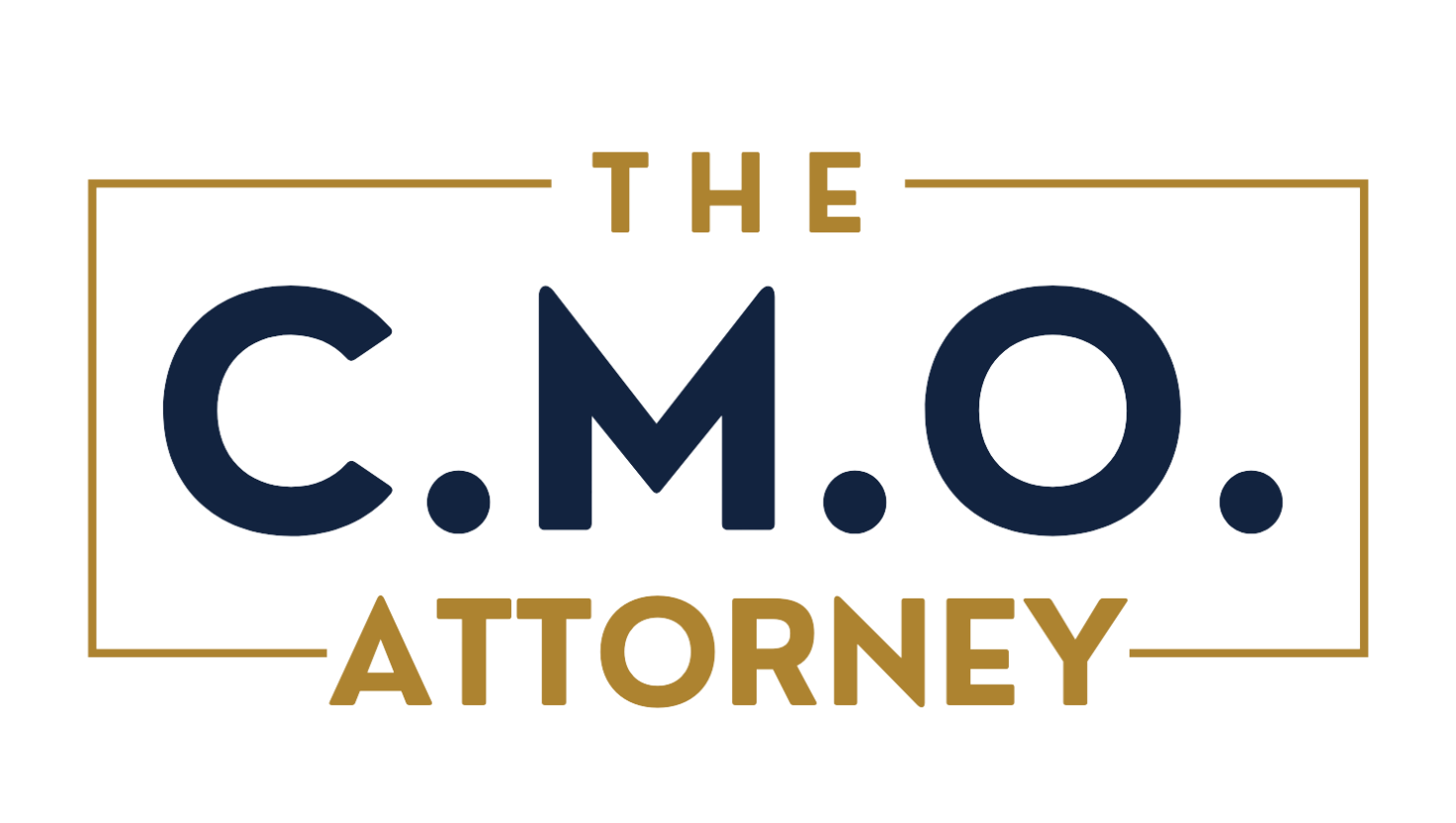

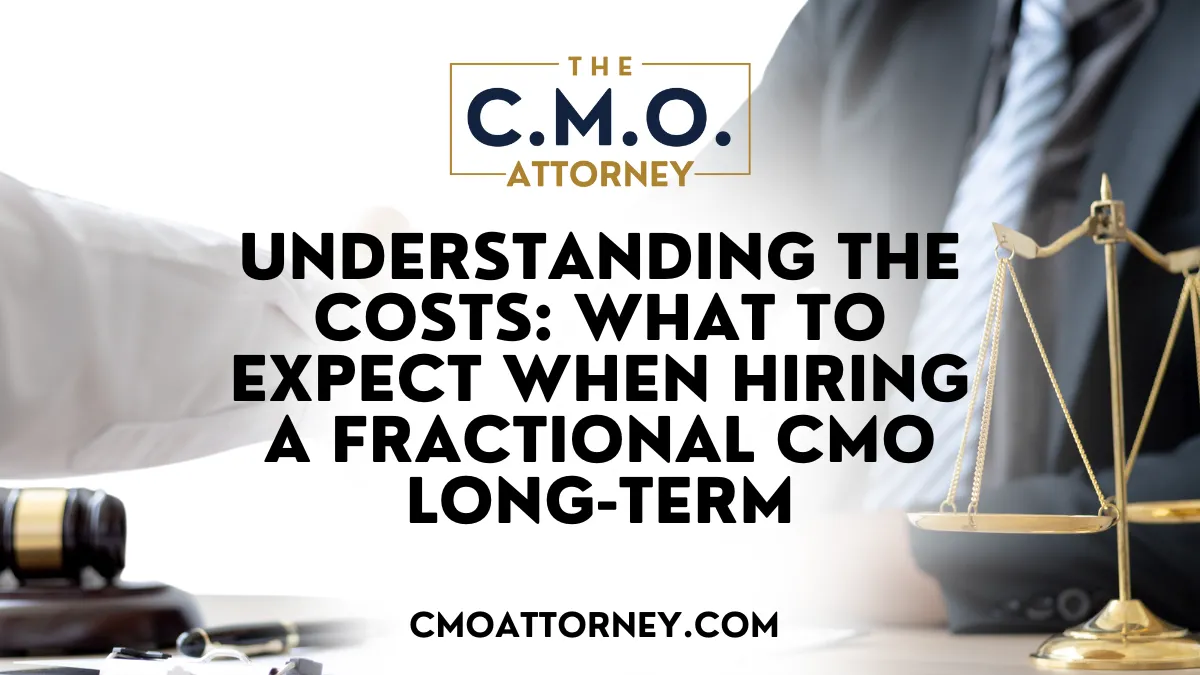
 Table Of Contents:
Table Of Contents: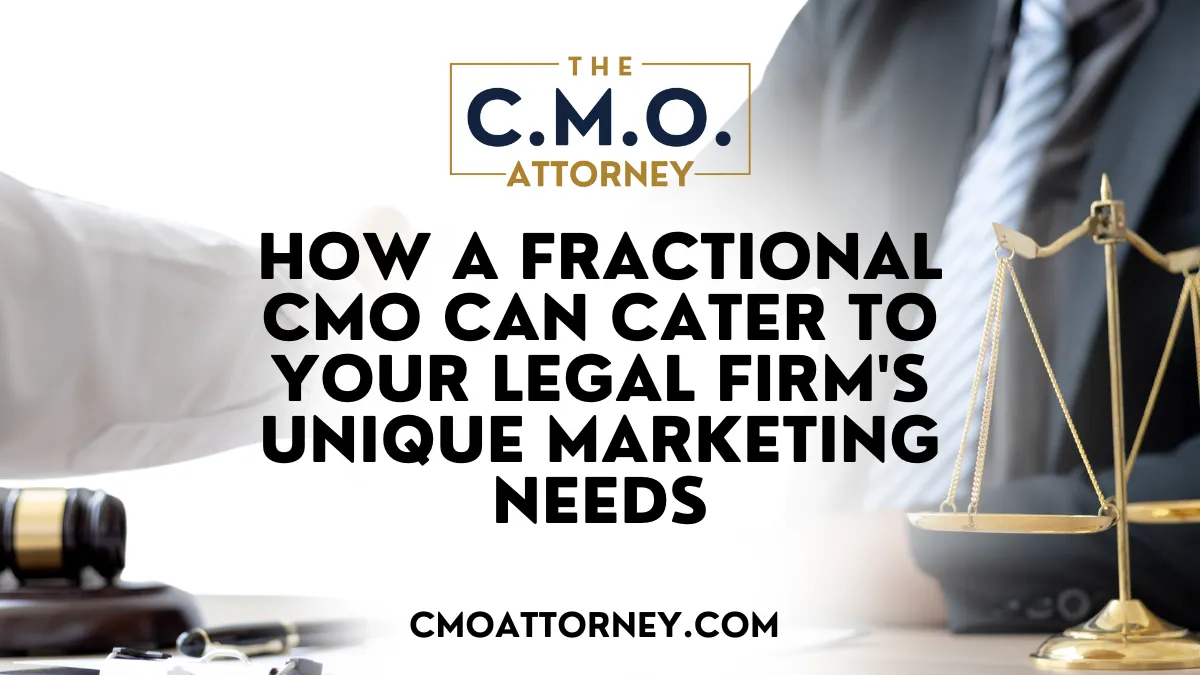
 Table Of Contents:
Table Of Contents: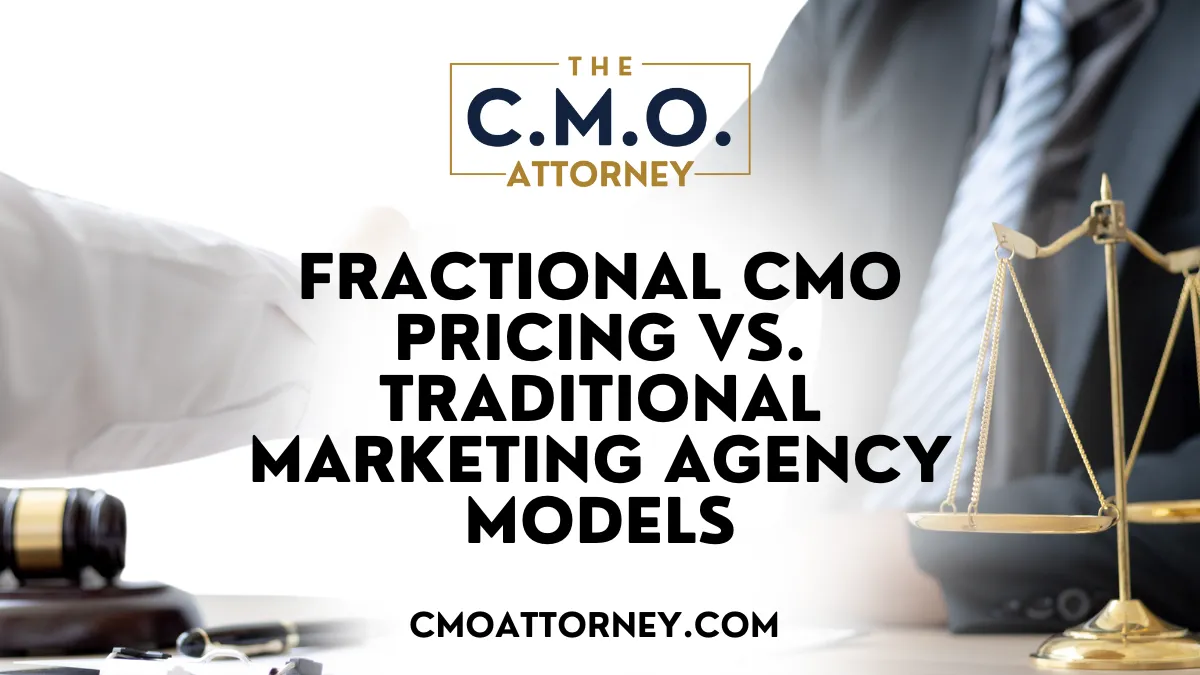
 Table Of Contents:
Table Of Contents: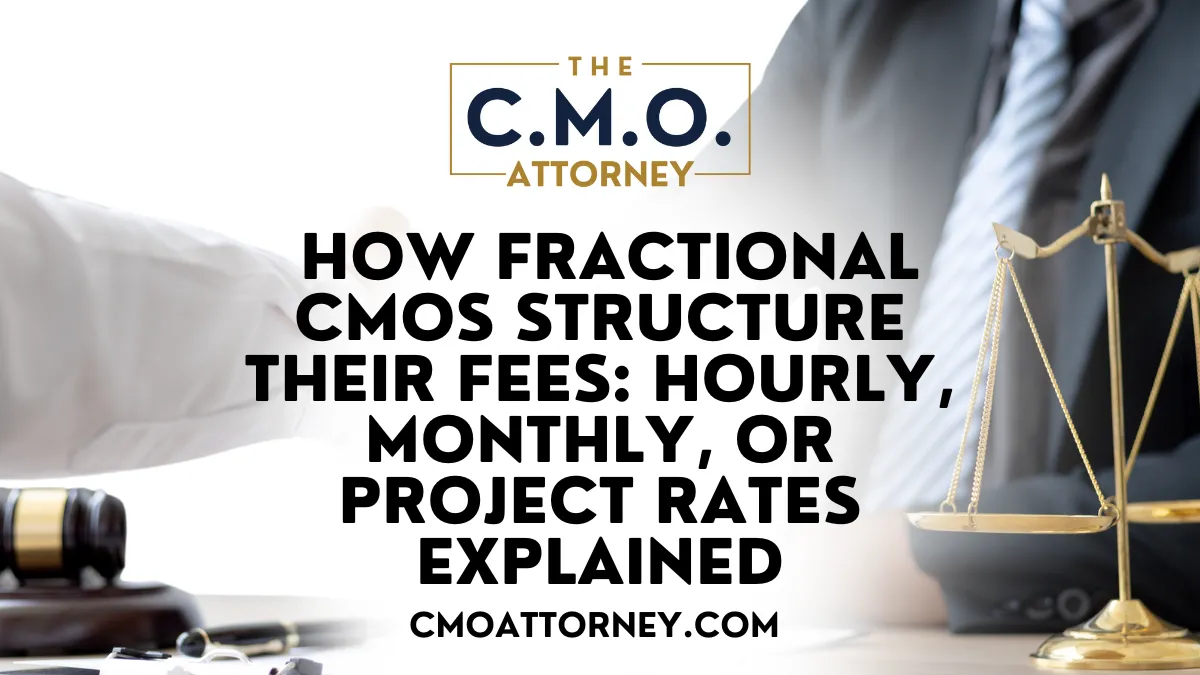
 Table Of Contents:
Table Of Contents: